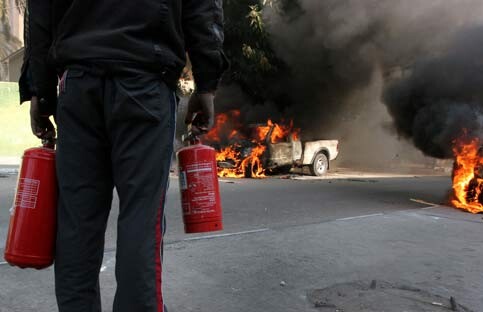The Electronic Intifada 27 December 2006

A Palestinian man holds fire extinguishers near burning cars after fresh clashes erupted between Fatah and Hamas militants near the office of the Palestinian Electric Company in Gaza City, December 20, 2006. (MaanImages/Wesam Saleh)
A major Palestinian and Arab demand has been quietly accepted by Israel and the US, but the Palestinians are too engrossed in their internal fighting to realize it.
After the collapse of the bilateral and unilateral efforts, the time has come for multilateralism. Palestinian-Israeli bilateral talks saw a high point in the Oslo process, but have stalled ever since. Israel’s unilateralism, both in south Lebanon and Gaza, has also been a major failure.
US State Department officials, seeing the failure of their own unilateralism in Iraq, have pushed Israel and found the Olmert administration receptive toward a multilateral approach.
Multilateralism is not completely new. For a few years now the international community has been working in the context of the Quartet. American, European, Russian and UN officials meet regularly to set policy on the Middle East.
The Quartet has largely been run by the US with active European involvement and symbolic Russian and UN membership. It has also been a tool to pressure the Palestinians, with the Israelis getting away with whatever they wanted to do.
Take for example the Road Map, which laid out step-by-step requirements for both sides in order to reach a negotiated settlement. The Palestinians accepted the Road Map, but the Israelis placed 14 major reservations to their acceptance of it, leaving map to spin its wheels without moving anywhere.
The new element in this multilateral approach has been what Dr. Condoleezza Rice calls moderate Arab states. What is new is that the Israelis are agreeing on the inclusion of countries like Saudi Arabia and Qatar, which have not recognized Israel. At the same time these countries are agreeing to take a more proactive position toward the Palestinian-Israeli conflict, including meeting with Israeli officials if necessary.
The Qataris, who have an Israeli representative office in Doha and their own independent foreign policy, are not overly concerned about the idea of meeting Israelis, but the Saudis are. A few meetings have taken place in secret, although the Israelis were quick to leak their existence, much to the unhappiness of the Saudis.
But the Saudis have not let the Israeli leaks stop their efforts as they realize that in order to defeat the radical Islamists in their society they have no choice but play a more active role in trying to remove the source of region’s troubles. Few would argue with the Saudis that the continuation of the plight of Palestinians and the lack of a resolution to the conflict continues to poison the air and provide extremists with political ammunition that allows them to agitate the entire region.
The recent Baker-Hamiliton study, which strongly recommended that the Palestinian Israeli conflict be resolved in order to begin dealing with the Iraqi situation, has added to the understanding that the US-Israeli honeymoon is over. With more parties now involved, especially from the Arab world, the US will have no choice but to play the honest-broker role that it claimed but did not live up to.
Palestinians, in the meantime, have not had a chance to benefit from the changes in the regional picture. Involving Arab as well as international players has always been a demand of Palestinian leaders who have felt that Israel and the US have monopolized policy toward the region.
For Palestinians to be able to benefit from these changes, a number of prerequisites are necessary. To begin with, current infighting and debates over the future must resolved, whether through a national unity government or early elections.
For the time being, Hamas is clearly on record agreeing that the PLO, headed by Abbas, should lead negotiations with Israel. Hamas will only make its position known once these elections reach fruition. At the same time, the home-made rockets must stop in order to remove this excuse that many opponents of peace are happy to use.
The majority of Israelis and Palestinians, as well as experts on the region’s conflict, know exactly how this conflict will be resolved: a Palestinian state somewhere around the ‘67 borders, and a fair solution of the refugee problem.
The missing piece of the puzzle has always the mechanism - how to translate what everyone knows is the most acceptable solution into a long-term peace agreement.
Multilateralism, combined with internal peace within the Palestinian community, can provide the needed mechanism to reach that coveted solution.
The writer is director of the Institute of Modern Media at Al-Quds University in Ramallah.
Related Links



